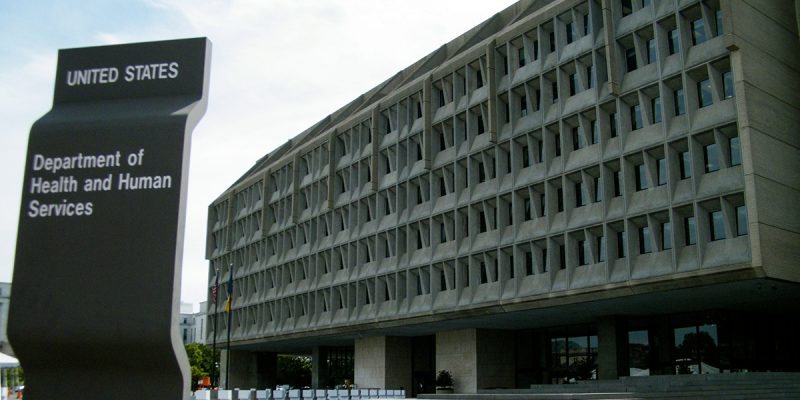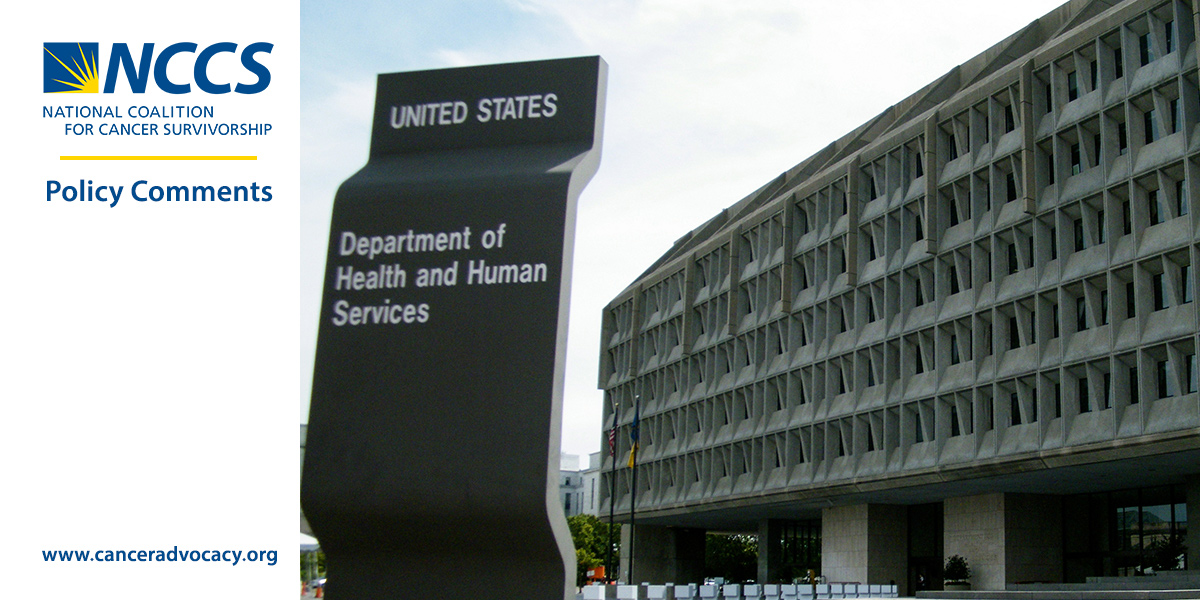NCCS Concerned That Proposed ACA Rule Changes Could Raise Costs for Patients and Disrupt Treatment

NCCS and member organizations of the Cancer Leadership Council (CLC) submitted comments to the Department of Health and Human Services (HHS) in response to the agency’s Notice of Benefits and Payment Parameters for 2020. The Notice contains rules and provisions that will apply to the individual market (the Affordable Care Act marketplace), and small group health insurance markets. The letter states NCCS’ concerns about specific provisions that may threaten cancer patients’ access to quality health care.Below are the specific provisions for which NCCS provided comments:
- NCCS urges CMS to reject any movement away from automatic re-enrollment for consumers in ACA marketplace plans. Automatic re-enrollment makes enrollment in health insurance more convenient and is consistent with private insurance practices.
- NCCS opposes making post-enrollment assistance optional for ACA navigators, as cancer care is complex and patients benefit from assistance in utilizing their insurance to pay for their care.
- NCCS opposes mid-year formulary changes that may change the cost-sharing for certain drugs. These formulary changes may put cancer patients at risk of disruption of their treatment plan and loss of access to the drugs recommended by their care team.
- NCCS cautions against the proposed change to the manner in which the premium adjustment factor is calculated. This could result in consumers facing higher maximum cost-sharing amounts and higher premiums. We urge CMS to retain the current methodology for calculation of premium adjustment factor and thereby retaining important protections for consumers.
Read the full letter below.
CANCER LEADERSHIP COUNCIL
A PATIENT-CENTERED FORUM OF NATIONAL ADVOCACY ORGANIZATIONS
ADDRESSING PUBLIC POLICY ISSUES IN CANCER
February 19, 2019
Seema Verma
Administrator
Centers for Medicare & Medicaid Services
Department of Health and Human Services
Hubert H. Humphrey Building
200 Independence Avenue, SW
Washington, DC 20201
RE: CMS-9926-P, Patient Protection and Affordable Care Act; HHS Notice of Benefit and Payment Parameters for 2020
Dear Administrator Verma:
The undersigned organizations represent people with cancer who need adequate and affordable insurance to ensure access to quality and timely cancer care. We are writing to share our concerns about provisions of the Notice of Benefit and Payment Parameters for 2020 that may threaten cancer patients’ access to quality care. We urge reconsideration of certain provisions of the proposal.
Automatic Re-Enrollment
The Centers for Medicare & Medicaid Services (CMS) does not propose ending automatic re-enrollment in 2020 but asks for comment on terminating the policy of automatic re-enrollment of consumers in exchange plans, beginning with plan year 2021. We urge the agency to reject any movement away from automatic enrollment. As the agency states, automatic re-enrollment makes enrolling in health insurance more convenient for the consumer and is consistent with private insurance practices. In our experience, the assurance that consumers will be enrolled in a plan at the end of open enrollment affords a protection that is important to cancer patients.
Some of our organizations offer assistance to patients as they evaluate their plan options, to help those patients select coverage adequate for their cancer care needs. We know firsthand that this selection process is not easy and materials about plan options are not always useful. As the agency notes, enrollment materials should be designed to be consumer-friendly so that consumers understand the value of the plans they are considering.
CMS signals a commitment to assisting with that design. We also support the efforts of CMS to “explore ways to increase the interoperability of patient-mediated health care data across health care programs, including in coverage purchased through the Exchanges.” Even if there is success in improving the materials available to consumers to support solid plan selection, we do not think that success would justify elimination of automatic re-enrollment.
The agency suggests that automatic re-enrollment makes consumers less aware of their plan options, blocks action to update their coverage and premium tax credit eligibility, and leads to unrecoverable federal spending if premium assistance is miscalculated. We agree that all these shortcomings of the enrollment process should be addressed. However, we do not believe that eliminating automatic re-enrollment would solve these problems.
The Role of Navigators
The proposed rule would make the provision of post-enrolment assistance by navigators in the federally facilitated exchanges an optional activity. We understand that reductions in funding for navigators have placed strains on the system. However, we believe the solution is to provide adequate resources for navigators instead of reconsidering the allowable activities of navigators.
In our experience, cancer patients face significant difficulties in understanding their health insurance coverage and how to use it most effectively to pay for quality cancer care. Cancer patients confront challenges related to network limits, coverage and payment standards for different elements of cancer care, and formulary issues.
All these issues may affect the choices and options for care available to them. Cancer care is typically complex and interdisciplinary, and patients benefit from assistance in utilizing their insurance to pay for their care. We urge a continuation of the requirement that navigators provide post-enrollment assistance.
Mid-Year Formulary Changes
CMS proposes to permit plans to make mid-year formulary changes to introduce new generic drugs to their formularies. Plans would be permitted to move the brand name drug for which a new generic drug is added to the formulary to a higher tier or drop the brand name drug from the formulary. Plan enrollees would be given a 60-day notice regarding mid-year formulary changes.
Mid-year formulary changes may put cancer patients at risk of disruption of their treatment plan and loss of access to the drugs recommended by their care team. We recommend that several patient protections be incorporated into this proposal. Patients who are utilizing a brand name drug for which a generic is introduced should not be required to switch to the generic drug without the recommendation of their care team. In connection with other drug pricing proposals discussed or advanced by this administration, this protection has been recommended.
We urge that it be included in this proposal. The plan should also provide at least 90 and preferably 120 days of notice of a formulary change. For patients already utilizing a brand name drug, this would be a lesser protection than permitting them to remain on current therapy. However, this 90-day or 120-day timeline should be included for all consumers, to permit them to plan their treatment with full knowledge of the current formulary. There must also be an efficient exceptions process, in the situations where a health care provider believes that the brand name should be utilized in place of the generic added to the formulary.
Calculation of Premium Adjustment Factor
The agency has proposed to change the manner in which the premium adjustment factor is calculated. Under the agency proposal, National Health Expenditure Account (NHEA) estimates for all types of health insurance (except Medigap plans) would be included in the calculation. This contrasts to the premium adjustment factor calculation of past years, which has been based on employer-sponsored insurance rates. The agency suggests that the change in the calculation will more closely reflect the premium trends for all individuals in the private insurance market since 2013.
It seems that the agency is making this change in the calculation to save federal funds and because it has determined to forgo policy changes to address so-called silver loading in 2020. We are concerned about the proposed calculation of premium adjustment factor, because of its significant financial effects on consumers and because it would result in a loss of insurance coverage.
CMS details the impact of the proposed changes in the premium adjustment factor calculation, including: 1) a higher maximum annual limitation on cost-sharing, 2) higher employer shared responsibility payment amounts, and 3) fewer employed individuals qualifying for the Advanced Premium Tax Credit, or APTC. In addition, CMS anticipates that the Department of the Treasury and the Internal Revenue Services will adopt the same premium measure, which would result in a decrease in the premium tax credit for which consumers would qualify and increase the contribution that consumers must make. The agency also predicts that the premium adjustment factor calculation will result in premium increases for exchange plans, in turn causing healthier enrollees not to purchase insurance on the exchanges.
Although the agency goal of reducing federal expenditures may be realized through this revised premium adjustment factor calculation, the corresponding impact on consumers will be significant and negative, as they face higher maximum cost-sharing amounts and higher premiums, in some cases resulting in decisions to forgo coverage.
We understand that the agency has considered a change to calculating the premium adjustment factor in the past but has rejected the change. We urge the agency to follow this example for 2020, by retaining the current methodology for calculation of premium adjustment factor and thereby retaining important protections for consumers.
If the change in the calculation is an indirect way of addressing silver loading, we recommend instead that the agency pursue a solution to payment of cost-sharing reductions and then address silver loading. We object to the change in the premium adjustment factor calculation because of the adverse effects of the change on consumers.
We appreciate the opportunity to comment on the proposed Notice of Benefit and Payment Parameters for 2020. We look forward to changes in the final notice, so that it more clearly reflects the needs of consumers who are seeking insurance coverage that protects their access to quality health care.
Sincerely,
Cancer Leadership Council
CancerCare
Cancer Support Community
The Children’s Cause for Cancer Advocacy
Fight Colorectal Cancer
International Myeloma Foundation
Leukemia & Lymphoma Society
LUNGevity Foundation
Lymphoma Research Foundation
National Coalition for Cancer Survivorship
Ovarian Cancer Research Alliance
Prevent Cancer Foundation
Susan G. Komen
2446 39th Street NW, Washington, D.C. 20007 · Phone: 202-333-4041 · www.cancerleadership.org# # #
Read more NCCS Policy Comments »
Related Posts
https://canceradvocacy.org/policy-comments/nccs-statement-hhs-final-rule-short-term-health-plans/
https://canceradvocacy.org/policy-comments/nccs-clc-recommendations-fda-biosimilar-action-plan/



